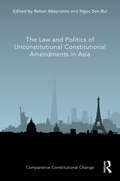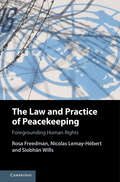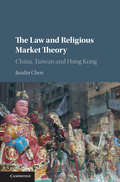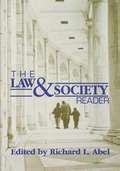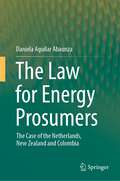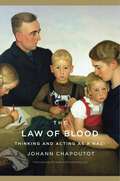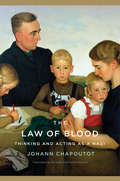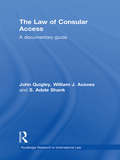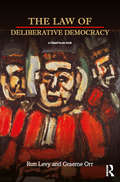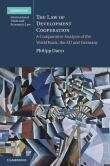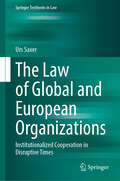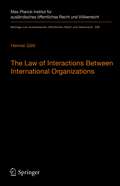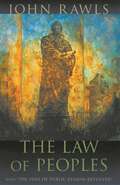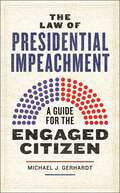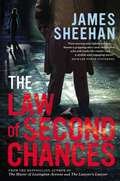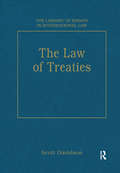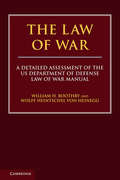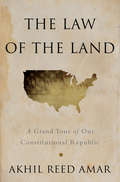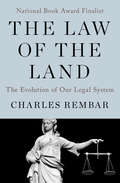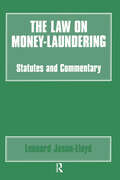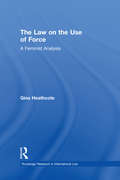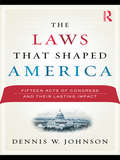- Table View
- List View
The Law and Politics of Unconstitutional Constitutional Amendments in Asia (Comparative Constitutional Change)
by Rehan Abeyratne and Ngoc Son BuiThis book explains how the idea and practice of UCA are shaped by, and inform, constitutional politics through various social and political actors, and in both formal and informal amendment processes, across Asia. This is the first book-length study of the law and politics of unconstitutional constitutional amendments in Asia. Comprising ten case studies from across the continent, and four broader, theoretical chapters, the volume provides an interdisciplinary, comparative perspective on the rising phenomenon of unconstitutional constitutional amendments (UCA) across a range of political, legal, and institutional contexts. The volume breaks new ground by venturing beyond the courts to consider UCA not only as a judicial doctrine, but also as a significant feature of political and intellectual discourse. The book will be a valuable reference for law and political science researchers, as well as for policymakers and NGOs working in related fields. Offering broad coverage of jurisdictions in East Asia, Southeast Asia and South Asia, it will be useful to scholars and practitioners within Asia as well as to those seeking to better understand the law and politics of the region.
The Law and Practice of Peacekeeping: Foregrounding Human Rights
by Rosa Freedman Nicolas Lemay-Hébert Siobhán WillsIn an increasingly complex world, it is more crucial than ever to have a full picture of how international peacekeeping can be a force for good, but can also have potentially negative impacts on host communities. After thirteen years of presence in Haiti, the highly controversial United Nations Stabilization Mission in Haiti has now withdrawn. The UN's legacy in Haiti is not all negative, but it does include sexual scandals, the divisive use of force to 'clean up' difficult neighbourhoods as well as a cholera epidemic, brought inadvertently by Nepalese peacekeepers that killed more than 8,000 Haitians and infected more than 600,000. This book presents a unique multi-disciplinary analysis of the legacy of the mission for Haiti. It presents an innovative account of contemporary international peacekeeping law and practice, arguing for a new model of accountability, going beyond the outdated immunity mechanisms to foreground human rights.
The Law and Religious Market Theory: China, Taiwan and Hong Kong
by Jianlin ChenWith comparative case studies from China, Taiwan and Hong Kong, Jianlin Chen's new work offers a fresh, descriptive and normative perspective on law and religion. This presentation of the original Law and Religious Market Theory employs an interdisciplinary approach that sheds light on this subject for scholars in legal and sociological disciplines. It sets out the precise nature of religious competition envisaged by the current legal regimes in the three jurisdictions and analyses how certain restrictions on religious practices may facilitate normatively desirable market dynamics. This updated and invaluable resource provides a new and insightful investigation into this fascinating area of law and religion in Greater China today.
The Law and Society Reader
by Richard L. AbelThis book seeks to provide answers to everything you ever wanted to know about the law—except what the rules are or ought to be. For centuries, the law has been considered a neutral, objective arena that sets societal standards and in which conflicting forces resolve disputes. More recently, however, the interaction between law and society has been recognized as a two-way street: society clearly exacts a considerable influence on the practice and evolution of law. Further, the discrepancy between what the law mandates and what the social reality is has served as evidence of the chasm between theory and practice, between the abstraction of law and its actual societal effects. Examining such issues as the limits of legal change and the capacity of law to act as a revolutionary agent, the essays in this book offer a well-rounded introduction to the relationship between law and society. By focusing on flashpoint issues in legal studies—equality, consciousness and ideology, social control--and making ample use of engaging case studies, The Law and Society Review provides an invaluable resource for scholars and students alike.
The Law for Energy Prosumers: The Case of the Netherlands, New Zealand and Colombia
by Daniela Aguilar AbaunzaThis book argues that law has a vital role in shaping the electricity system to enable a more active role for consumers in liberalizsed electricity industries. To do that, this book offers a unique legal perspective of the Netherlands, New Zealand and Colombia to help understand some of the current legal approaches to prosumers and therefore the legal challenges and opportunities facing. Law and regulation have the role of creating a level playing field for emerging participants, such as prosumers, to participate and compete in the market together with traditional actors, bringing not only more competition but also representing a more sustainable, environmental and democratic way to supply energy. Furthermore, law and regulation have the role of responding to innovation and creating space for technological advances to procure the changes in the industry without delay. This book examines some of the legal barriers for the raise of energy prosumers. The traditional role of the distributor when responding to increasing distributed generation in the network; prosumers unable to decide to whom they can sell their electricity to; the price of the energy or even whether to participate more actively in demand response programs. A further issue is the lack of clarity about whether small prosumers are entitled to consumer protection rights and legal challenges regarding configuration, access to the network, access to markets and strict unbundling rules for community energy projects. This book provides a clear, analytical, and informed approach to understanding the regulatory framework around energy prosumers. It will appeal to policy makers, lawyers, individuals, business entrepreneurs or communities wanting to engage in energy projects, as well as academics, researchers and students
The Law of Blood: Thinking and Acting as a Nazi
by Johann ChapoutotThe scale and the depth of Nazi brutality seem to defy understanding. What could drive people to fight, kill, and destroy with such ruthless ambition? Observers and historians have offered countless explanations since the 1930s. According to Johann Chapoutot, we need to understand better how the Nazis explained it themselves. We need a clearer view, in particular, of how they were steeped in and spread the idea that history gave them no choice: it was either kill or die. Chapoutot, one of France’s leading historians, spent years immersing himself in the texts and images that reflected and shaped the mental world of Nazi ideologues, and that the Nazis disseminated to the German public. The party had no official ur-text of ideology, values, and history. But a clear narrative emerges from the myriad works of intellectuals, apparatchiks, journalists, and movie-makers that Chapoutot explores. The story went like this: In the ancient world, the Nordic-German race lived in harmony with the laws of nature. But since Late Antiquity, corrupt foreign norms and values—Jewish values in particular—had alienated Germany from itself and from all that was natural. The time had come, under the Nazis, to return to the fundamental law of blood. Germany must fight, conquer, and procreate, or perish. History did not concern itself with right and wrong, only brute necessity. A remarkable work of scholarship and insight, The Law of Blood recreates the chilling ideas and outlook that would cost millions their lives.
The Law of Blood: Thinking and Acting as a Nazi
by Johann ChapoutotThe scale and the depth of Nazi brutality seem to defy understanding. What could drive people to fight, kill, and destroy with such ruthless ambition? Observers and historians have offered countless explanations since the 1930s. According to Johann Chapoutot, we need to understand better how the Nazis explained it themselves. We need a clearer view, in particular, of how they were steeped in and spread the idea that history gave them no choice: it was either kill or die. Chapoutot, one of France’s leading historians, spent years immersing himself in the texts and images that reflected and shaped the mental world of Nazi ideologues, and that the Nazis disseminated to the German public. The party had no official ur-text of ideology, values, and history. But a clear narrative emerges from the myriad works of intellectuals, apparatchiks, journalists, and movie-makers that Chapoutot explores. The story went like this: In the ancient world, the Nordic-German race lived in harmony with the laws of nature. But since Late Antiquity, corrupt foreign norms and values—Jewish values in particular—had alienated Germany from itself and from all that was natural. The time had come, under the Nazis, to return to the fundamental law of blood. Germany must fight, conquer, and procreate, or perish. History did not concern itself with right and wrong, only brute necessity. A remarkable work of scholarship and insight, The Law of Blood recreates the chilling ideas and outlook that would cost millions their lives.
The Law of Collaborative Defence Procurement in the European Union
by Heuninckx Baudouin McipsStates increasingly cooperate to buy expensive defence equipment, but the management and legal aspects of these large collaborative procurement programmes are complex and not well understood. The Law of Collaborative Defence Procurement in the European Union analyses how these programmes are managed, and highlights areas which require improvement. The book addresses the law applicable to these programmes, which is built upon a four-layer 'matryoshka doll' of legal relationships at the crossroads of public international law, EU law and domestic law. Using practical examples, the book makes proposals for clarifying the legal basis and improving the efficiency of defence equipment cooperation among EU member states. By covering a broad scope of legal issues, this analysis goes beyond the defence sector and is relevant to centralised or joint purchasing and procurement activities of international organisations, providing invaluable information for practitioners, policy-makers and academics aiming to analyse or improve these projects.
The Law of Consular Access: A Documentary Guide (Routledge Research in International Law)
by John Quigley William J. Aceves Adele ShankOver the past decade, there has been an explosion of litigation at the international and domestic levels concerning consular access for foreign nationals charged with a criminal offence. The issue has complicated relations between countries, with the majority of litigation involving the United States, which has adopted a restrictive view of the consular access obligation. This book brings together for the first time relevant documentary sources on the law of consular access. The book includes significant excerpts alongside commentary on the documents, allowing readers to draw their own conclusions. While presenting information on the Vienna Convention on Consular Relations, the book presents other sources, including bilateral consular agreements, multilateral treaties, and key court cases from various jurisdictions. Many of these sources are not readily accessible. The Law of Consular Access will be of interest to scholars of international law, human rights, and international relations. It will also be of interest to private and government lawyers, as well as diplomats and consuls.
The Law of Deliberative Democracy
by Ron Levy Graeme OrrLaws have colonised most of the corners of political practice, and now substantially determine the process and even the product of democracy. Yet analysis of these laws of politics has been hobbled by a limited set of theories about politics. Largely absent is the perspective of deliberative democracy – a rising theme in political studies that seeks a more rational, cooperative, informed, and truly democratic politics. Legal and political scholarship often view each other in reductive terms. This book breaks through such caricatures to provide the first full-length examination of whether and how the law of politics can match deliberative democratic ideals. Essential reading for those interested in either law or politics, the book presents a challenging critique of laws governing electoral politics in the English-speaking world. Judges often act as spoilers, vetoing or naively reshaping schemes meant to enhance deliberation. This pattern testifies to deliberation’s weak penetration into legal consciousness. It is also a fault of deliberative democracy scholarship itself, which says little about how deliberation connects with the actual practice of law. Superficially, the law of politics and deliberative democracy appear starkly incompatible. Yet, after laying out this critique, The Law of Deliberative Democracy considers prospects for reform. The book contends that the conflict between law and public deliberation is not inevitable: it results from judicial and legislative choices. An extended, original analysis demonstrates how lawyers and deliberativists can engage with each other to bridge their two solitudes.
The Law of Development Cooperation
by Philipp DannDevelopment interventions are agreed by states and international organisations which administer public development funds of huge proportions. They have done so with debatable success, but, unlike the good governance of recipients, the rules applying to donors have hitherto received little scrutiny. This analysis of the normative structures and conceptual riddles of development co-operation argues that development co-operation is increasingly structured by legal rules and is therefore no longer merely a matter of politics, economics or ethics. By focusing on the rules of development co-operation, it puts forward a new perspective on the institutional law dealing with the process, instruments and organisation of this co-operation. Placing the law in its theoretical and political context, it provides the first comparative study on the laws of foreign aid as a central field of global public policy and asks how accountability, autonomy and human rights can be preserved while combating poverty.
The Law of Global and European Organizations: Institutionalized Cooperation in Disruptive Times (Springer Textbooks in Law)
by Urs SaxerThis textbook, which is aimed at students, academics and interested individuals (journalists, representatives of state or civil society institutions, NGOs), deals with institutionalized cooperation based on international organizations and addresses the law and the role of these organizations in international law and politics. This topic is highly relevant as we live in disruptive times. This makes international cooperation all the more important in overcoming the numerous challenges that the international system and mankind face.The book begins with a general section that explains the legal and theoretical bases of international organizations as pivotal institutions of cooperation between states. This is followed by a closer look at the most important global and European organizations. At the global level, the UN as the central institution of the state system with its collective security mechanisms deserves special attention. International economic organizations are also of great importance, as they legally constitute and steer the global economy. The WTO is an institution that monitors and, if necessary, enforces compliance by states with the central trade agreements GATT, GATS and TRIPS. The Bretton Woods institutions have special features that make them interesting not only because of their obvious global economic impact, but also from a legal perspective. This includes their structure and mode of operation, which is modelled after private-sector companies. At the European level, the OSCE is a remarkable organization because it is based exclusively on soft law. At the same time, it is a regional collective security organization under Chapter VIII of the UN Charter. The Council of Europe is a traditional organization dedicated to human rights and the rule of law, but it has special institutional characteristics due to its close connection to the European Court of Human Rights. NATO is the prototype of a collective defense organization and has special characteristics in terms of decision-making (unanimity), institutions and cooperation with third countries. The EU is the prototype of a supranational organization as the next higher level of intergovernmental cooperation, which is based on the partial integration of powers originally belonging to the member states.All organizations covered in this book have their own unique characteristics, and together they provide a multi-layered picture of the impact of international organizations in the international system. The book concludes with a chapter on NGOs as institutions of international civil society that play an important role in the development of global strategies and international legal standards.
The Law of Interactions Between International Organizations: A Framework for Multi-Institutional Labour Governance (Beiträge zum ausländischen öffentlichen Recht und Völkerrecht #299)
by Henner GöttThe book analyses how international law addresses interactions between international organizations. In labour governance, these interactions are ubiquitous. They offer each organization an opportunity to promote its model of labour governance, yet simultaneously expose it to adverse influence from others. The book captures this ambivalence and examines the capacity of international law to mitigate it. Based on detailed case studies of mutual influence between the International Labour Organization, the World Bank, and the Council of Europe, the book offers an in-depth analysis of the pertinent law and its key challenges, both at institutional and inter-organizational level. The author envisions a law of inter-organizational interactions as a normative framework structuring interactions and enhancing the effectiveness and legitimacy of multi-institutional governance.
The Law of Peoples: With “The Idea of Public Reason Revisited”
by John RawlsThis book consists of two parts: “The Law of Peoples,” a major reworking of a much shorter article by the same name published in 1993, and the essay “The Idea of Public Reason Revisited,” first published in 1997. Taken together, they are the culmination of more than fifty years of reflection on liberalism and on some of the most pressing problems of our times by John Rawls.“The Law of Peoples” extends the idea of a social contract to the Society of Peoples and lays out the general principles that can and should be accepted by both liberal and non-liberal societies as the standard for regulating their behavior toward one another. In particular, it draws a crucial distinction between basic human rights and the rights of each citizen of a liberal constitutional democracy. It explores the terms under which such a society may appropriately wage war against an “outlaw society” and discusses the moral grounds for rendering assistance to non-liberal societies burdened by unfavorable political and economic conditions.“The Idea of Public Reason Revisited” explains why the constraints of public reason, a concept first discussed in Political Liberalism (1993), are ones that holders of both religious and non-religious comprehensive views can reasonably endorse. It is Rawls’s most detailed account of how a modern constitutional democracy, based on a liberal political conception, could and would be viewed as legitimate by reasonable citizens who on religious, philosophical, or moral grounds do not themselves accept a liberal comprehensive doctrine—such as that of Kant, or Mill, or Rawls’s own “Justice as Fairness,” presented in A Theory of Justice (1971).
The Law of Presidential Impeachment: A Guide for the Engaged Citizen
by Michael J. GerhardtA clear and comprehensive overview of presidential impeachment from a leading expert in the fieldAs a result of Donald Trump’s presidency, impeachment was once again thrust into the spotlight of American political discussion. However, its history goes back to the very founding of the nation, when American colonists, remembering their grievances against their former king, entrenched the process in their new Constitution.The Law of Presidential Impeachment breaks down both the law and politics of this process, providing a comprehensive, nonpartisan, and up-to-date explanation of the Constitution’s various mechanisms for holding presidents accountable for their misdeeds. Based on a lifetime of scholarly research, as well as unique experience as a witness and consultant in the impeachment trials of Bill Clinton and Donald Trump, Michael J. Gerhardt’s new book takes the reader back to the basics of presidential impeachments. Rather than provide reasons for or against impeaching particular presidents, he explains the law and procedures that govern impeachment, examining a number of significant, yet under-explored, issues and themes. Gerhardt offers new perspectives on the subject, arguing that it cannot be properly understood in a vacuum, but must instead be viewed in the context of its coordination with such other mechanisms as criminal prosecutions, censure, elections, congressional oversight, and the Fourteenth and Twenty-Fifth Amendments.The Law of Presidential Impeachment will be an invaluable, accessible guide for future generations, giving them a succinct yet remarkably nuanced understanding of this core aspect of our executive branch and overarching governmental system.
The Law of Refugee Status
by James C. Hathaway Michelle FosterThe first edition of The Law of Refugee Status (published in 1991) is generally regarded as the seminal text on interpreting the refugee definition set by the UN's 1951 Refugee Convention. Its groundbreaking analysis served as the bedrock for not only much judicial reasoning, but also for a burgeoning academic literature in law and related fields. This second edition builds on the strong critical focus and human rights orientation of the first edition, but undertakes an entirely original analysis of the jurisprudence of leading common law and select civil law states. The authors provide robust responses to the most difficult questions of refugee status in a clear and direct way. The result is a comprehensive and truly global analysis of the central question in asylum law: who is a refugee?
The Law of Second Chances
by James SheehanJack Tobin, a Florida trial lawyer, is committed to justice for the innocent. But when he's presented with Henry Wilson's case, he's unsure of the convict's innocence. Wilson has eight weeks to live, and Tobin has to decide if he can and will help him.Benny Avrile is a small-time thief with his eye on an oil man's big billfold. But Benny is way over his head on this one. The robbery goes bad, and the oil man ends up dead. Just when Benny's fate is all but sealed, an old friend from Jack's past reaches out...The clock is ticking on Henry Wilson's life, the cops are in hot pursuit of Benny, and back at home, there are dark clouds on the horizon for Jack and his beautiful wife, Pat.
The Law of Treaties (The\library Of Essays In International Law Ser.)
by Scott DavidsonThe centrality of treaties to the international legal system requires little emphasis. Not only is the treaty a source of law that the International Court of Justice (ICJ) is bound to apply when resolving international disputes, but it is also the medium through which the vast preponderance of international legal intercourse is now conducted. The essays contained in this informative volume disclose a wide variety of opinion on a broad range of issues concerning the conclusion, application and termination of treaties.
The Law of War: A Detailed Assessment of the US Department of Defense Law of War Manual
by William H. Boothby Von Heinegg Wolff HeintschelIn 2015, the United States Department of Defense published its long-awaited Law of War Manual making a significant statement on the position of the US government on important military matters. Whilst readers recognise the Manual's legal and strategic importance, they may question whether particular statements of law are legally accurate or complete. This book offers a unique in-depth review of the complete Manual, including revisions, on a paragraph-by-paragraph, line-by-line and word-by-word basis. The authors offer their personal assessment of the DoD's declared view as to the law that regulates the conduct of warfare, a subject of unparalleled current importance. William H. Boothby and Wolff Heintschel von Heinegg offer a balanced, articulate and authoritative critique for readers perusing the Manual in whatever capacity.
The Law of the Land: A Grand Tour of Our Constitutional Republic
by Akhil Reed AmarFrom Kennebunkport to Kauai, from the Rio Grande to the Northern Rockies, ours is a vast republic. While we may be united under one Constitution, separate and distinct states remain, each with its own constitution and culture. Geographic idiosyncrasies add more than just local character. Regional understandings of law and justice have shaped and reshaped our nation throughout history. America’s Constitution, our founding and unifying document, looks slightly different in California than it does in Kansas. In The Law of the Land, renowned legal scholar Akhil Reed Amar illustrates how geography, federalism, and regionalism have influenced some of the biggest questions in American constitutional law. Writing about Illinois, "the land of Lincoln,” Amar shows how our sixteenth president’s ideas about secession were influenced by his Midwestern upbringing and outlook. All of today’s Supreme Court justices, Amar notes, learned their law in the Northeast, and New Yorkers of various sorts dominate the judiciary as never before. The curious Bush v. Gore decision, Amar insists, must be assessed with careful attention to Florida law and the Florida Constitution. The second amendment appears in a particularly interesting light, he argues, when viewed from the perspective of Rocky Mountain cowboys and cowgirls. Propelled by Amar’s distinctively smart, lucid, and engaging prose, these essays allow general readers to see the historical roots of, and contemporary solutions to, many important constitutional questions. The Law of the Land illuminates our nation’s history and politics, and shows how America’s various local parts fit together to form a grand federal framework.
The Law of the Land: The Evolution of Our Legal System
by Charles RembarFinalist for the National Book Award: A fascinating history of Anglo-American law from one of its most important practitioners What do the thoughts of a ravenous tiger have to do with the evolution of America's legal system? How do the works of Jane Austen and Ludwig van Beethoven relate to corporal punishment? In The Law of the Land, Charles Rembar examines these and many other topics, illustrating the surprisingly entertaining history of US law. Best known for his passionate efforts to protect literature, including Lady Chatterley's Lover, from censorship laws, Rembar offers an exciting look at the democratic judicial system that will appeal to lawyers and laymen alike. From the dark days of medieval England, when legal disputes were settled by duel, through recent paradigm shifts in the interpretation and application of the legal code, The Law of the Land is a compelling and informative history of the rules and regulations we so often take for granted.
The Law on Money Laundering: Statutes and Commentary
by Leonard Jason-LloydThe statutory provisions on the laundering of money are complex and wide-ranging, due to their origin in legislation which spans prevention of terrorism, drug trafficking and criminal justice. This book links these statutory provisions, with subject matter explained by a commentary.
The Law on the Use of Force: A Feminist Analysis (Routledge Research in International Law)
by Gina HeathcoteThe book presents the international laws on the use of force whilst demonstrating the unique insight a feminist analysis offers this central area of international law. The book highlights key conceptual barriers to the enhanced application of the law of the use of force, and develops international feminist method through rigorous engagement with the key writers in the field The book looks at the key aspects of the UN Charter relevant to the use of force – Article 2(4), Article 51 and Chapter VII powers – as well as engaging with contemporary debates on the possibility of justified force to meet self-determination or humanitarian goals. The text also discusses the arguments in favour of the use of pre-emptive force and reflects on the role feminist legal theories can play in exposing the inconsistencies of contemporary arguments for justified force under the banner of the war on terror. Throughout the text state practice and institutional documentation are analysed, alongside key instances of the use of force. The book makes a genuine, urgently needed contribution to a central area of international law, demonstrating the capacity of feminist legal theories to enlarge our understanding of key international legal dilemmas.
The Laws (Cambridge Library Collection - Classics Ser.)
by PlatoIn the Laws, Plato describes in fascinating detail a comprehensive system of legislation in a small agricultural utopia he named Magnesia. His laws not only govern crime and punishment, but also form a code of conduct for all aspects of life in his ideal state - from education, sport and religion to sexual behaviour, marriage and drinking parties. Plato sets out a plan for the day-to-day rule of Magnesia, administered by citizens and elected officials, with supreme power held by a Council. Although Plato's views that citizens should act in complete obedience to the law have been read as totalitarian, the Laws nonetheless constitutes a highly impressive programme for the reform of society and provides a crucial insight into the mind of one of Classical Greece's foremost thinkers.
The Laws That Shaped America: Fifteen Acts of Congress and Their Lasting Impact
by Dennis W. JohnsonFor better and sometimes for worse, Congress is a reflection of the aspirations, wants, and priorities of the American people. It reflects the kaleidoscope of special interests and unselfish service to others, of favors sought and sacrifices made. During each two-year session of Congress, thousands of pieces of legislation are proposed, many hundreds are given serious consideration, but far fewer are eventually enacted into law. Most enactments have limited impact, affect few, and are quietly forgotten in the flow of legislative activity. However, a small number of laws have risen to the level of historical consequence. These are the laws that have shaped America, and they are the subject of this book. Which pieces of legislation were the most significant for the development of the nation? Which have had an immediate or lasting impact on our society? Which laws so affected us that we could not imagine how our lives would be without them? Dennis W. Johnson vividly portrays the story of fifteen major laws enacted over the course of two centuries of American democracy. For each law, he examines the forces and circumstances that led to its enactment--the power struggles between rival interests, the competition between lawmakers and the administration, the compromises and principled stands, and the impact of the legislation and its place in American history.
